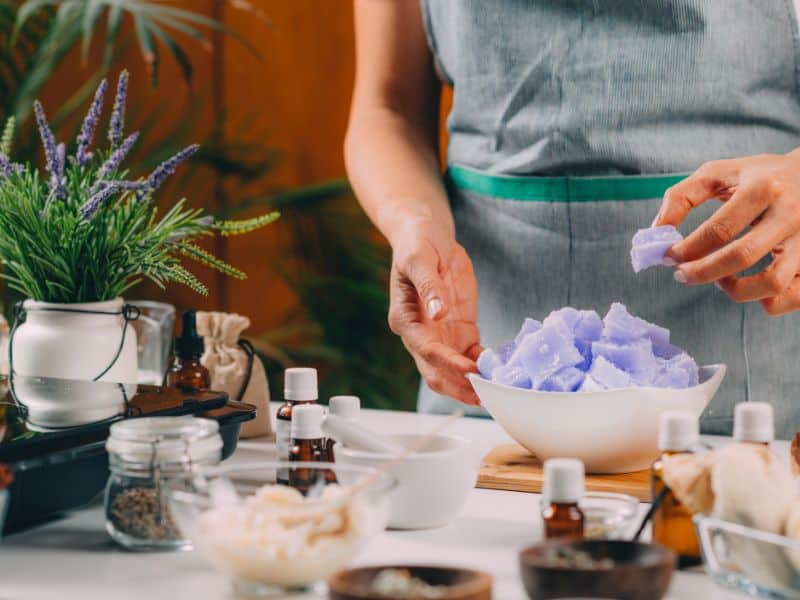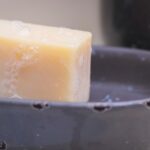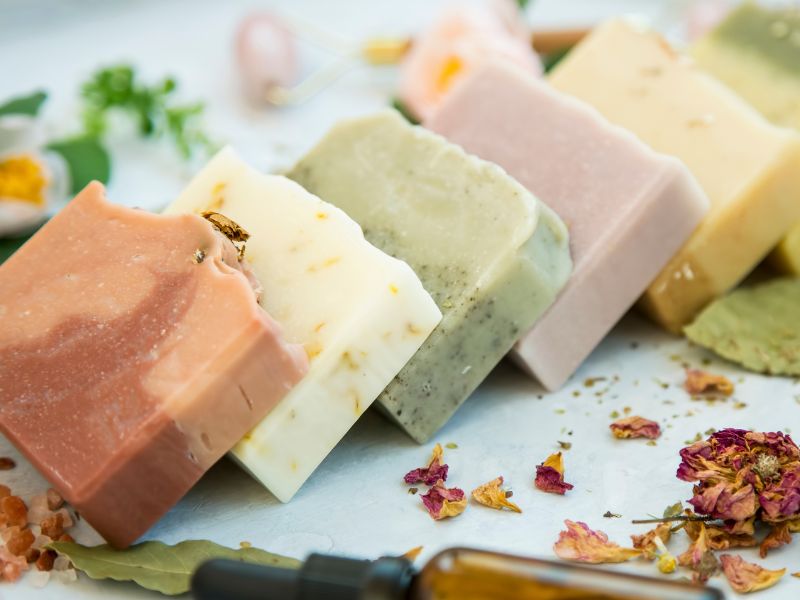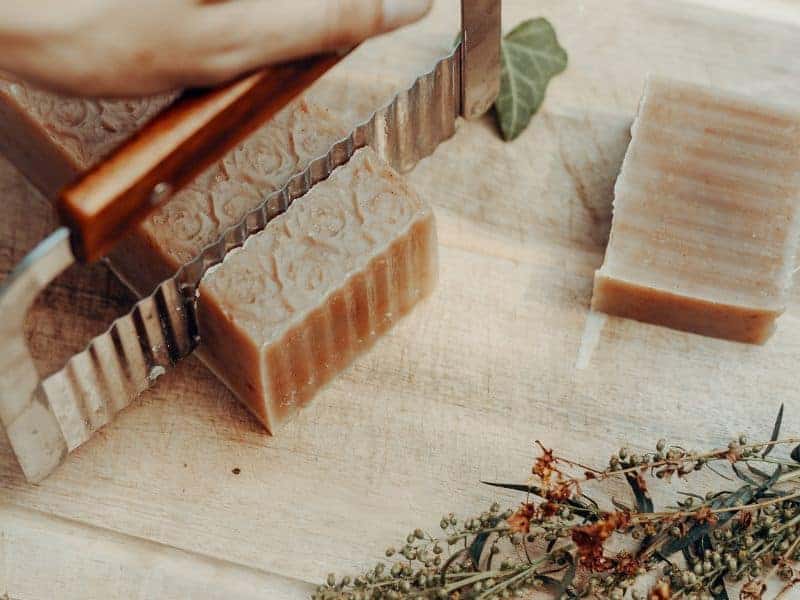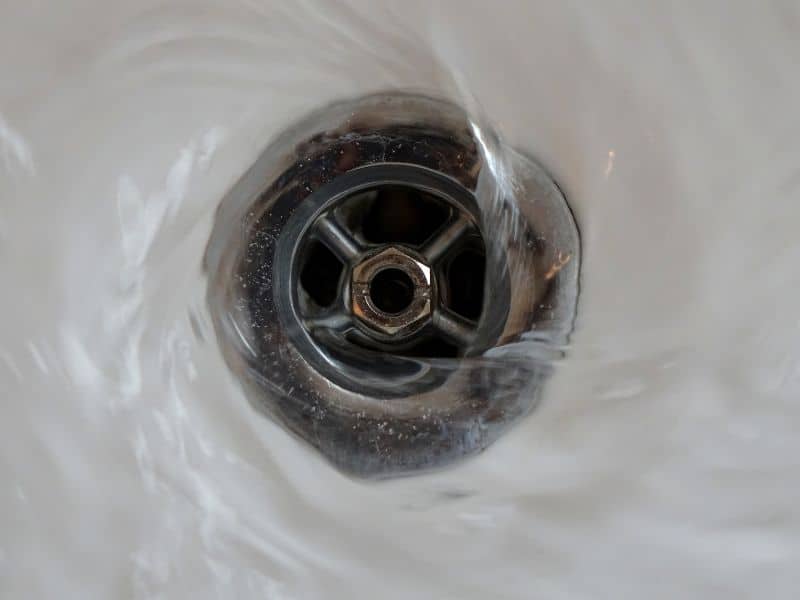Homemade soap can be a great way to save money, customize it to your own needs, and even make it as a gift for others. But is making homemade soap really worth the effort? We will explore all of the pros and cons of making your own handmade soaps. So let’s get started!
Making homemade soap is worth it because it provides a superior product that allows for the customization of ingredients, scents, and shapes while also providing an eco-friendly and sustainable option for skincare. It can also serve as a rewarding creative outlet.
Homemade soap is actually soap, and if you use them, it is made with all-natural ingredients. Soap from stores includes so many synthetic ingredients that it cannot really even be considered soap anymore.
Let’s take a closer look at this issue.
Natural Ingredients Are Worth It
Control Over Ingredients
Using natural ingredients is a primary reason for making homemade soap due to the numerous benefits they offer for skincare. Homemade soap makers have control over the ingredients used, ensuring that only natural and beneficial ingredients are used to create a soap that is gentle and effective on the skin. Natural oils, butters, and essential oils can help to moisturize, heal, and soothe the skin, making homemade soap an excellent choice for anyone with sensitive or dry skin.
Eco-Friendly And Sustainable
Moreover, using natural ingredients in homemade soap is also eco-friendly and sustainable. Many homemade soap makers use organic and sustainably sourced ingredients to ensure that their products are environmentally friendly and safe for the skin.
Additionally, making homemade soap can be a fun and creative activity that allows for customization of ingredients, scents, colors, and shapes. Overall, using natural ingredients is an excellent reason for making homemade soap for those who prioritize natural skincare and eco-friendly practices.
Getting Creative is Worth It
Form of Expression
Making homemade soap is worth it as a creative outlet and form of expression because it allows for endless possibilities for customization and creativity. Homemade soap makers can experiment with different ingredients, colors, shapes, and scents to create a soap that is unique to their preferences and style. This creative process can be therapeutic, allowing soap makers to express their artistic side while also producing a useful product.
Fun Activity to Share
Moreover, making homemade soap can also be a fun activity to share with friends and family, providing a sense of community and bonding. It can be a rewarding experience to see a finished product that was created from scratch with your own hands. Homemade soap can also be given as gifts, showcasing the soap maker’s creativity and thoughtfulness. Overall, making homemade soap is a worthwhile creative outlet and form of expression that offers both personal satisfaction and practical benefits.
Benefits of Homemade Soap
Use of natural ingredients
One of the biggest benefits of homemade soap is the ability to control the ingredients used in the soap. Homemade soap is often made with natural ingredients such as essential oils, herbs, and plant-based oils, which can be beneficial for the skin.
Customization options
Homemade soap offers a range of customization options, such as choosing specific scents or adding exfoliants or other additives to the soap. This allows soap makers to create soap bars that meet their specific needs and preferences.
Environmental benefits
Homemade soap is often made with biodegradable and eco-friendly ingredients, which can be better for the environment than mass-produced soaps that may contain harsh chemicals.
DIY at Home
Homemade soap also offers the convenience of being able to make it at home, without having to purchase expensive supplies or tools. All that is needed to make soap is a few basic ingredients and some common kitchen items.
Supporting small businesses
Making homemade soap can also support small businesses and local artisans who sell their soap at markets or online. By purchasing homemade soap, consumers can directly support these businesses and their communities.
Drawbacks of Homemade Soap
Time-consuming
Making homemade soap can be a time-consuming process, especially for those who are new to soap making. This can be a deterrent for those who are looking for a quick and easy solution.
Cost of materials and equipment
The cost of materials and equipment needed for soap making can add up quickly, which can make homemade soap more expensive than store-bought options.
Difficulty in achieving consistent results
Consistent Results: Achieving consistent results with homemade soap can be challenging, especially for those who are new to soap making. This can result in variations in the quality of the soap.
Limited shelf life
Homemade soap typically has a shorter shelf life than store-bought options, which means that it may not last as long before needing to be used or discarded.
Cost Comparison
Homemade soap can be less expensive than store-bought options in the long run, especially if you purchase ingredients in bulk. However, the initial investment in supplies, such as a scale, thermometer, and soap mold, can be costly. The cost of materials and equipment can vary depending on the type of soap you want to make, the ingredients you use, and where you buy them.
Factors that can impact the cost of homemade soap include the quality of ingredients, the size and shape of the soap, and the complexity of the recipe. While it may be tempting to use cheaper ingredients, it’s important to consider the quality of the soap and its impact on your skin.
Quality Comparison
Homemade soap is generally of higher quality than store-bought soap. This is because homemade soap is made with high-quality natural ingredients, such as essential oils, butters, and plant-based oils, that are beneficial for the skin. Store-bought soap, on the other hand, often contains synthetic fragrances, harsh chemicals, and preservatives that can be harmful to the skin.
Using high-quality ingredients in homemade soap can offer several benefits, such as moisturizing and nourishing the skin, reducing inflammation, and promoting healing. To ensure consistent quality in homemade soap, it’s important to use precise measurements and follow the recipe carefully. It’s also important to properly cure the soap before using it.
Negatives of Commercial Soap
Commercial soaps can be bad for several reasons. First, they often contain synthetic fragrances, preservatives, and other harsh chemicals that can be irritating to the skin. These ingredients can also strip the skin of its natural oils, leading to dryness and other issues.
Low Quality
In addition, commercial soaps may use low-quality and unsustainable ingredients, such as palm oil, which can contribute to deforestation and environmental degradation.
Waste and Pollution
The production of commercial soaps also generates a significant amount of waste and pollution.
Less Care
Commercial soaps are often mass-produced, which means they lack the individual care and attention to detail that handmade soaps can offer. This can result in a product that is less effective and less enjoyable to use.
Misleading Branding
Finally, the marketing and branding of commercial soaps can be misleading, with claims of being “natural” or “gentle” that may not necessarily be true. These tactics can be used to appeal to consumers who are seeking more natural and eco-friendly skincare products, leading them to believe they are making a better choice when in reality they may not be.
Overall, while commercial soaps may be convenient and readily available, they can come at a cost to both our skin and the environment. Choosing to use or make natural, homemade soap can be a more sustainable and beneficial choice.
Frequently Asked Questions
Yes, as the cost of homemade soap can be lower than store-bought soap.
It depends on the individual’s perspective and priorities. Some may find it enjoyable and worth the time, while others may prefer to purchase soap instead.
Yes, as homemade soap often uses natural and beneficial ingredients that can be gentler on the skin than commercial soap.
Yes, as homemade soap makers often use sustainably sourced and organic ingredients, as well as reduce packaging waste.
Yes, homemade soap can be customized with different scents, colors, and textures.
Yes, homemade soap can make a thoughtful and unique gift.
Yes, making homemade soap can be a fun and creative hobby for those interested in DIY skincare products.
Conclusion
In conclusion, if you are making homemade soap to get a superior product then it is worth it. Homemade soap can also be a fun and rewarding experience. However, it is important to weigh the pros and cons before deciding if homemade soap is worth it for you.
Consider factors such as cost, quality of ingredients, time commitment, and shelf life before making a decision. With careful consideration and research, you can make an informed decision about whether or not homemade soap is worth it for you. Good luck!

